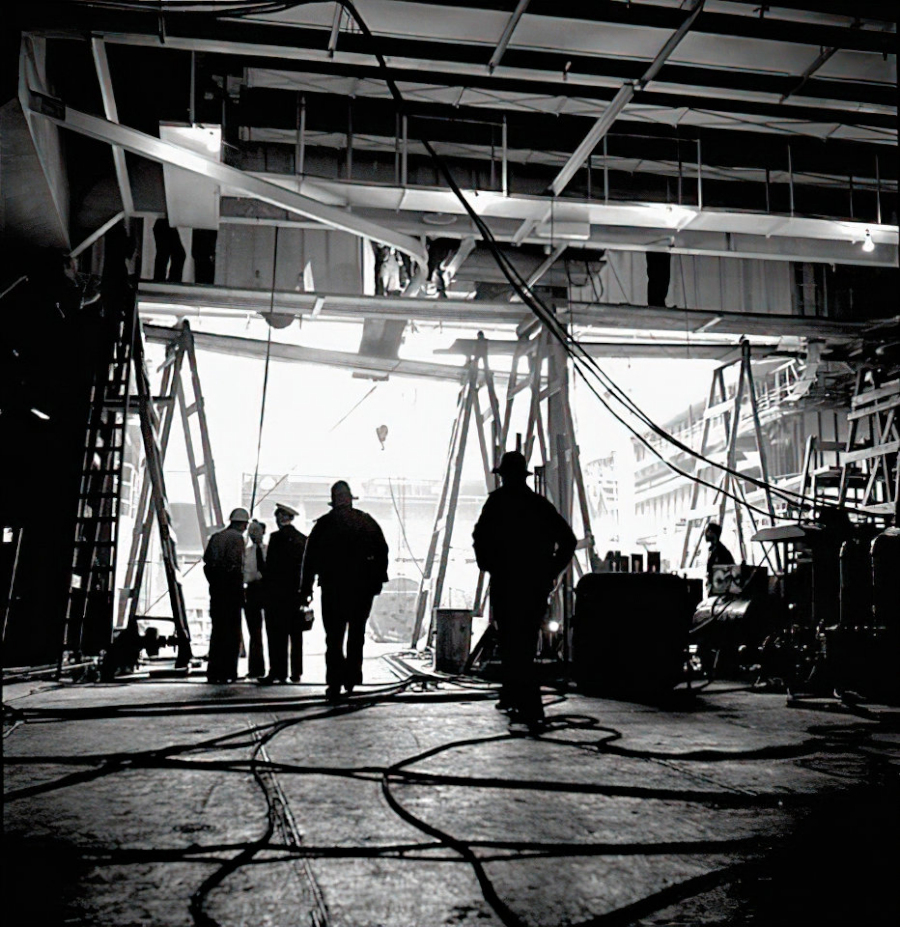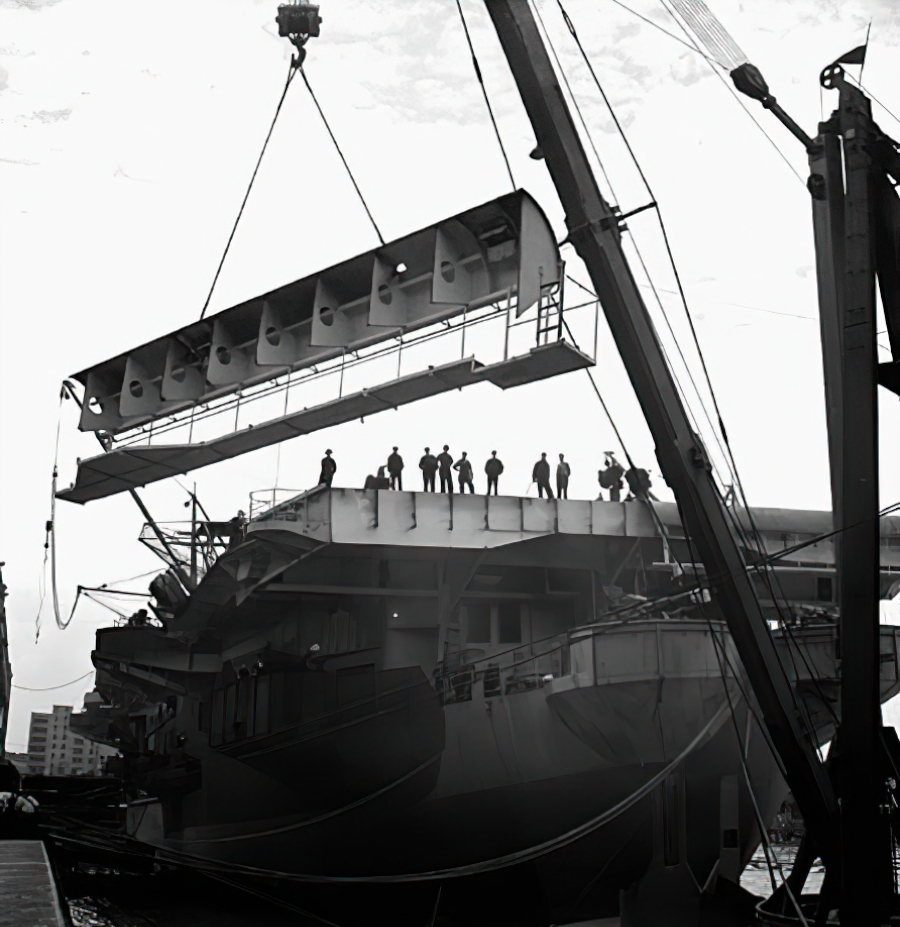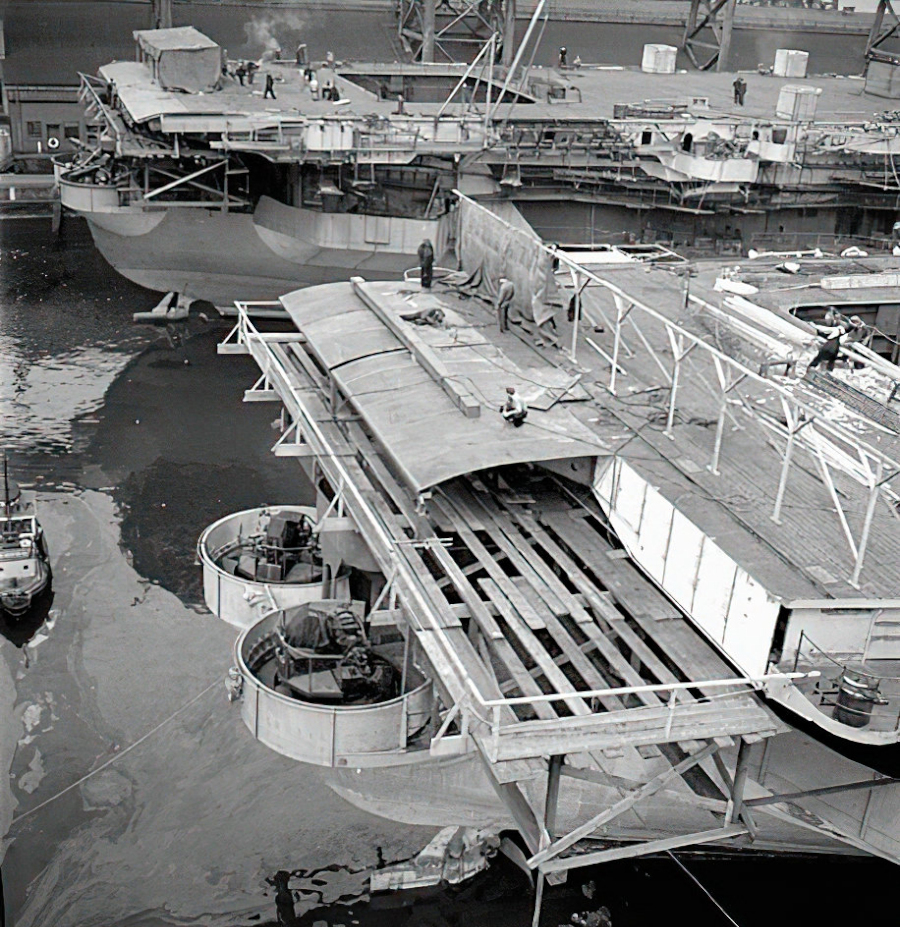

All of the new aircraft carriers built for transfer to the Royal Navy required modification and alteration in order to conform to Admiralty requirements; British dockyards were at full capacity and could only handle four out of the twenty-three that formed the second batch of Bogue class carriers being supplied under the Lend-lease agreement. The Canadian Government agreed to fund the necessary work in a Canadian yard, enabling the 18 ships to be operational on leaving the Pacific for the UK. The contract was awarded to the Burrard Dry-Dock Co Ltd of North Vancouver; the completed vessels arriving there from Portland and Seattle at a steady rate of one or two a month starting in July 1943.




Planning allowed for a 45 day programme with as many as 6 ships in hand at one time, the ships moving through the yard from berth to berth as specific tasks were completed. This created a serious problem initially as power was only available at two of the eight berths, towards the end of the programme this number had risen to four.
The work entailed 150 separate modifications which included extending the flight deck by 15 feet at the stern, and making major changes to the aviation fuel stowage and hangar safety measures. None of the work carried out at Vancouver was designed to equip the CVE for any specific role; all the vessels were delivered as ‘general purpose’ carriers able to operate American Torpedo Bombers and fighter aircraft that were in use with the Royal Navy Modification into the Assault and ASW specific roles was carried out in the UK after delivery.




Work on the first ten vessels was to take far longer than the planned 45 day rotation; this delay was caused by defective Low Pressure Turbine Rotors. Repairs entailed the Turbine Rotor being removed and sent to the makers, Messrs. Allis Chalmers in Milwaukee, for partial re-blading, returned to Vancouver and refitted. On average this operation required at least four weeks. In later ships the alterations to the turbines were done by the U.S. Shipbuilders.
All the CVE’s required dry-docking, and initially all were to be fitted with Asdic equipment and additional sea valves; the first ten ships were docked using the Floating Dock at Burrards Dry-Dock, North Yard. This work was done in the middle of the programme so these ships, which were awaiting replacement LP turbines, had to be moved between yards by tugs. From ARBITER onwards the fitting of Asdic was cancelled and the rotor issued had been corrected before leaving the builder’s yards; these ships were docked at the RCN naval base at Esquimalt after the Burrards work had been finished.


|
Ships modified by Burrard Dry-Dock Co. |
|||||||
|---|---|---|---|---|---|---|---|
|
|
Ship's name |
Due Vancouver |
Arrived Vancouver |
Work started |
Work completed
|
Days to complete |
Notes |
|
CVE 35 |
18-Jul-43 |
9-Jul-43 |
22-Jul-43 |
18-Oct-43* |
89 |
LP Rotor despatched 10 Sep |
|
|
CVE 33 |
1-Aug-43 |
31-Jul-43 |
1-Aug-43 |
28-Oct-43*† |
89 |
LP Rotor despatched 17 Sep |
|
|
CVE 36 |
15-Aug-43 |
1-Aug-43 |
4-Aug-43 |
25-Nov-43* |
114 |
LP Rotor despatched 24 Sep |
|
|
CVE 38 Ω |
1-Oct-43 |
12-Aug-43 |
30-Aug-43 |
6-Dec-43* |
99 |
LP Rotor despatched 10 Oct |
|
|
CVE 43 |
15-Oct-43 |
17-Oct-43 |
18-Oct-43 |
11-Dec-43 |
55 |
LP Rotor despatched 15 Oct |
|
|
CVE 41 |
1-Nov-43 |
10-Sep-32 |
1-Nov-43 |
21-Dec-43* |
51 |
LP Rotor despatched 9 Oct, |
|
|
CVE 42 Ω |
15-Nov-43 |
18-Nov-43 |
19-Nov-43 |
9-Jan-44* |
53 |
LP Rotor despatched ? |
|
|
CVE 46 |
RANEE |
19-Nov-43 |
? |
? |
? |
? |
Received minimal modifications to bring her to operational status for aircraft ferrying. Sailed from Esquimalt for San Francisco 4-Feb-44 |
|
CVE 40 |
30-Nov-43 |
7-Dec-43 |
8-Dec-43 |
25-Jan-44 |
49 |
LP Rotor despatched 22 -Nov |
|
|
CVE 49 Ω |
15-Dec-43 |
16-Dec-43 |
17-Dec-43 |
7-Feb-44 |
49 |
||
|
CVE 50 |
31-Dec-43 |
29-Dec-43 |
3-Jam-44 |
19-Feb-44 |
48 |
||
|
CVE 51 Ω |
15-Jam-44 |
17-Jam-44 |
18-Jam-44 |
2-Mar-44 |
45 |
Dry docked at Esquimalt 13 to 16-Mar-44 |
|
|
CVE 45 |
31-Jam-44 |
1-Feb-44 |
2-Feb-44 |
31-Mar-44 |
45 |
Dry docked at Esquimalt 20 to 23-Mar-44 |
|
|
CVE 52 |
14-Feb-44 |
14-Feb-44 |
15-Feb-44 |
31-Mar-44 |
47 |
Dry docked at Esquimalt 1 to 4-Apr-44 |
|
|
CVE 47 Ω |
29-Feb-44 |
21-Feb-44 |
29-Feb-44 |
16-Apr-44 |
47 |
Dry docked at Esquimalt 16 to 19-Apr-44 |
|
|
CVE 53 |
15-Mar-44 |
28-Feb-44 |
15-Mar-44 |
8-May-44 |
55 |
||
|
CVE 54 |
31-Mar-44 |
21-Mar-44 |
31-Mar-44 |
24-May-44 |
55 |
||
|
CVE 48 |
15-Apr-44 |
10-Apr-44 |
15-Apr-44 |
8-Jun-44 |
55 |
Dry docked at Esquimalt 10 to 14-Jun-44 |
|
|
CVE 44 |
30-Apr-44 |
1-May-44 |
2-May-44 |
28-Jun-44 |
58 * |
Should have arrived in Vancouver in October, between SHAH & NABOB but instead undertook a ferry voyage to India. After limited alteration and working-up in the Seattle area, she sailed on 22-Nov-43. |
|
|
CVE 46 |
18-May-44 |
14-May-44 |
15-May-44 |
12-Jul-44 |
59 * |
Released from ferry duty returned to Vancouver to
complete alterations. |
|
| Ω Fully operational on arrival * Date alterations completed. † Date LP Rotor installation completed | |||||||
| Thanks to Mr. David Weaver, author of ‘The History of HMS Queen – A World War II Lend Lease Escort Aircraft Carrier’ for sharing his research into the activities of the Burrard Dry-Dock Co. | |||||||
© 1999-2024 The Royal Navy Research Archive All Rights Reserved Terms of use Powered byW3.CSS
Shape: Standard, circular.
Blazon (Heraldic description) On a blue field: A ram in the act of butting, proper.
------: One who assaults or assails an opponent. The butting Ram in the design is an illustration of this act. The original design suggested by the ship’s officers depicted a stylised seahorse, having the head and neck of a horse, the body and tail of a griffon with feathered wigs and two hind legs with talons. Volant, ready to dive. It also carried the unofficial motto “Oppugnare, vincere est” – "Attack to conquer”. A bronze cast of this design was made by her builder and was displayed on the quarterdeck until the official design was approved in 1943.
For explanations of heraldic terms see the
Royal
Navy Ship's Badges page.